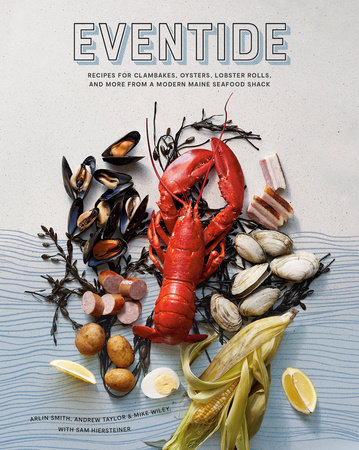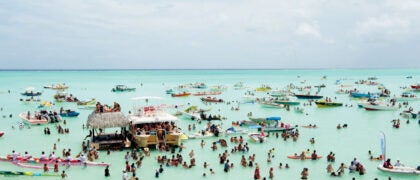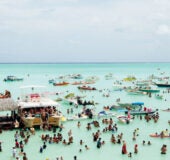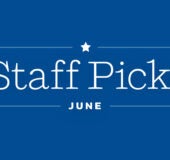Introduction: Breeze Blown' In Sometimes inspiration strikes like a lightning bolt, and other times it’s a slow burn. The groundwork for our little restaurant was laid decades ago, during happy summers spent with family traversing New England’s coast, including the rocky shores in Maine. Our childhood experiences scavenging crabs, clams, in-shore fish, and seaweed deeply influenced the Eventide concept and menu, as did the clam shacks and lobster pounds that are given altar-like reverence in New England. These singular, superlative experiences became so ingrained in our minds that when we set out to put modern touches on them, we had an incredible sense of nostalgia to build on.
But as we look back on the journey, we also have to be transparent about something: we didn’t know what the hell we were doing, really. By most of the laws and conventions of the restaurant industry and common business sense, Eventide should have been the entrepreneurial equivalent of a spectacular dumpster fire.
We opened in the summer of 2012 in quaint Portland, Maine—population 67,000. Although we put in some years together at Hugo’s, a trailblazing restaurant in terms of Portland fine dining, we had no hands-on experience in getting an establishment up and running. Our budget was a frayed shoestring, and we didn’t base many (any?) of our key decisions on sound restaurant business practices.
The seemingly bold decisions were actually naivety at work. We designed the restaurant ourselves on drafting paper and hired a local residential carpenter to build it out. We put in only two tables because, well, we didn’t like tables. We decided not to build a kitchen and had no hood fan. Our stovetop firepower included one induction burner and a tabletop fryer to match. We failed to foresee that our monumental stone oyster basin, dubbed “The Rock,” was going to destroy multiple floors with plumbing issues and condensation in the years to come. We opened with absolutely no art on the walls because we couldn’t afford any.
Discoveries of setbacks and our own mistakes grew more frequent, as did the daily, anxiety-driven vomiting in the shower. A peek behind the scenes at the chaos suggested that it was exactly the rookie disaster that it deserved to be.
And yet—and we say this with the same mix of shock and bemusement we’ve had all along—Eventide has been busy since day one. People even found it charming.
The bighearted little city of Portland took the leap with us from the moment the doors opened. Man, do we love this town.
The Backstory The first thing our first customer said to us, after he wandered in, not knowing we were open yet, and looked incredulously around the space, was, “Where are all the seats?” For a bunch of greenhorns who could have used some positive reinforcement at the time, that hurt. The proverbial pain was amplified because that first customer happened to be Dana Street.
Dana and his James Beard Award–winning partner, chef Sam Hayward, are the proprietors of Fore Street, which opened in 1996 as the first real, excellent, farm-and fishery-to-table restaurant in Portland. To this day, it remains the quintessential Maine restaurant (the team also owns Street and Co., Standard Baking Co., and Scales). Dana and Sam, along with James Beard Award–winners chef Rob Evans of Duckfat and Rob Tod of Allagash Brewing, were the first to bring any kind of national food and beverage media attention to Maine.
In fact, it was at Hugo’s, Rob Evans and his wife Nancy Pugh’s restaurant, that the three of us (Arlin, Andrew, and Mike) met. Arlin arrived first as general manager in 2009, after graduating from the Culinary Institute of America in Hyde Park, New York, and working a mix of front-of-house positions in restaurants in the Hudson Valley. Andrew came through a short time later as sous chef, after stints at Thierry Rautureau’s Rover’s in Seattle and Ken Oringer’s Clio in Boston. The last piece of the puzzle was Mike, who started in 2010 as a line cook, after working restaurants, getting a graduate degree, and skiing sick lines in Colorado.
At the time, Hugo’s was considered a pioneering restaurant, bringing modern elements into the tradition-bound fare of New England and, more specifically, the cuisine of Maine. And it punched above its weight, because Rob had come to Portland in 2000 from chef Thomas Keller’s The French Laundry in the Napa Valley, one of the world’s best restaurants and an incredible wellspring of culinary talent. Hugo’s was a modern restaurant that followed high gastronomic trends from Napa, New York, and western European capitals. Despite the accolades that it garnered, it had never really been embraced with open arms by the community the way Eventide was later (things have changed now, but that’s for another book). We learned that Mainers like things that are simple and low-key, rather
than superconceptual. Nevertheless, the heritage, heretical element, and ethos overall at Hugo’s spoke to us at a deep level, and given that Rob and Nancy had largely stepped away from the day-to-day at the restaurant by the time Mike arrived, the three of us had the chance to develop our own collective point of view. That’s pretty rare, to be thrust into that kind of creative opportunity together, and we intended to push in our own direction.
Fast-forward two years, and some pretty powerful forces (hubris, opportunity, and pregnancy among them) coalesced to vault us into the terrifying world of restaurant owner-operators. And while we were in way over our heads in so many ways, we were lucky to have a few things going for us: a wave of change in the restaurant world and in Portland, an incredibly supportive local community, and the best ingredients on earth at our fingertips, to name a few.
Copyright © 2020 by Arlin Smith, Andrew Taylor, and Mike Wiley with Sam Hiersteiner. All rights reserved. No part of this excerpt may be reproduced or reprinted without permission in writing from the publisher.











